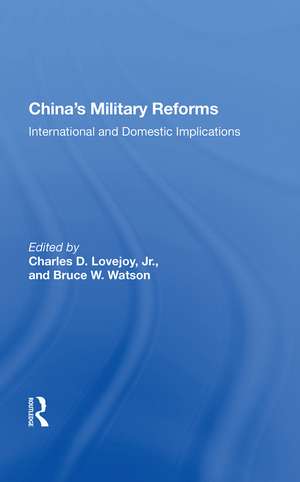China's Military Reforms: International And Domestic Implications
Editat de Charles D. Lovejoyen Limba Engleză Hardback – 7 iun 2019
Preț: 764.30 lei
Preț vechi: 1102.85 lei
-31% Nou
Puncte Express: 1146
Preț estimativ în valută:
146.27€ • 152.14$ • 120.75£
146.27€ • 152.14$ • 120.75£
Carte tipărită la comandă
Livrare economică 15-29 aprilie
Preluare comenzi: 021 569.72.76
Specificații
ISBN-13: 9780367010416
ISBN-10: 0367010410
Pagini: 162
Dimensiuni: 141 x 220 mm
Greutate: 0.46 kg
Ediția:1
Editura: Taylor & Francis
Colecția Routledge
Locul publicării:Oxford, United Kingdom
ISBN-10: 0367010410
Pagini: 162
Dimensiuni: 141 x 220 mm
Greutate: 0.46 kg
Ediția:1
Editura: Taylor & Francis
Colecția Routledge
Locul publicării:Oxford, United Kingdom
Cuprins
Preface -- People‘s War Revised: Military Doctrine, Strategy, and Operations1 -- The Interplay of Science and Technology in Chinese Military Modernization -- Implications of the Post-Mao Reforms on the Chinese Defense Industries -- Foreign Technology and Chinese Modernization1 -- Chinese Weapons Development: Process, Progress, Program? -- The Reform of Military Education in China: An Overview* -- Developments in China’s Nuclear Weapons and Attitudes Toward Arms Control -- Summary: China‘s Military Modernization: A Systemic Analysis1
Descriere
China’s reform policies during the past decade have resulted in the reorganization of economic and political structures and have led to a dramatic reorientation of the nation’s foreign policy. These reforms have especially influenced China’s military establishment, which is now in a period of major transition. What new paradigm is replacing the old Maoist model of People’s War, however, is not clear. This book examines what China’s military modernization means for the global and regional balance of power and for China’s internal political-economic system. Specific chapters focus on changes in Chinese strategy and doctrine, developments in defense industries and military procurements, China’s acquisition of foreign technology, its military education system, and its nuclear weapons program.
